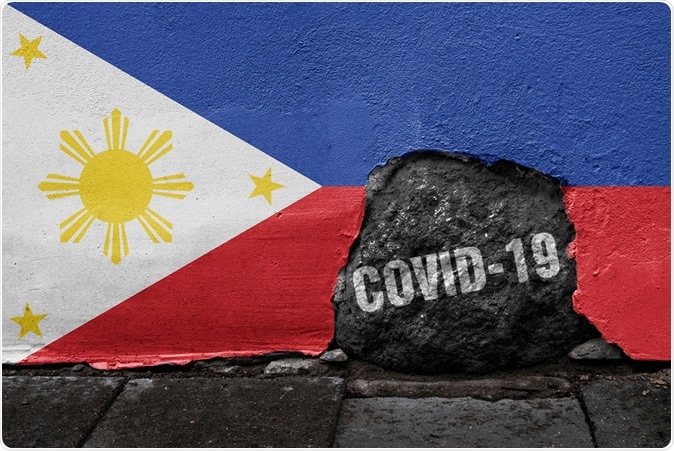The Philippine government has imposed a strict community quarantine order amid the coronavirus disease (COVID-19) outbreak. Residents, however, have concerns, as the guidelines require that everyone should as much as possible stay at home.

Novel Coronavirus (2019-nCoV) in the Republic of the Philippines. Image Credit: Bekulnis / Shutterstock
The guideline of 'enhanced community quarantine' includes the suspension of all mass transportation, closure of schools and universities, checkpoints at borders, and the cancellation of domestic air, sea, and land travel. International flights have also been halted.
Under the new measure, the government will also implement strict quarantine and the regulation of the provision of food and essential health services.
“The idea is to keep everybody in home quarantine. The mindset should be, in case of doubt, stay at home,” Cabinet Secretary Karlo Nograles said.
“For outbound international passengers traveling from Luzon, he said they would be allowed to leave the country within 72 hours from the start of the enhanced quarantine. Those who want to leave will leave within that period. We assume that after 72 hours, it is your decision to stay here,” he added.
Millions in their homes
Millions of people in the Philippines were left confined after the implementation of the new community quarantine order, causing chaos in the country’s capital, Manila. The National Capital Region (NCR) first reported the cases of confirmed COVID-19. As of writing, the country has 187 confirmed cases and 12 deaths, with the highest fatality rate globally of 8 percent.
In the capital, there are long queues of workers wanting to cross the border to attend work. Some companies have already suspended work, including non-essential businesses that are ordered to close. Companies that offer basic necessities and services remain open, including takeaway restaurants, water stations, supermarkets, banks, and pharmacies.
On Mar. 17, the President, Rodrigo Roa Duterte placed the entire Luzon region into lockdown to combat the coronavirus disease, which has now taken more than 7,900 lives worldwide, with a total of 197,496 confirmed cases. In the entire Luzon region, public transport is suspended, with residents who still need to work crowding the borders in the hopes of hitching a ride to and from work.
Several companies have promised to maintain the salaries of affected employees, while others continue their operations. Health care workers, government workers, police officers, military, and other front liners are still required to work, facing the threat of infection and serving the country.
Lockdown confusion
Still, there is confusion and frustration concerning the orders which aim to hinder the spread of the coronavirus, estimated to infect as many as 70,000 Filipinos. The Philippines does not have adequate resources to face a pandemic, with the healthcare system groaning for more supplies of PPEs for its health workers.
Many Filipinos are worried about how to make both ends meet. The World Bank has projected that the poverty incidence in the country is at 24.5 percent for 2016, and 21.9 percent for 2018, based on the lower-middle-income poverty line of $3.20 per day.
Workers are confused and frustrated about how to earn income for their families amid the quarantine orders. However, the government has assured that there are food and basic supplies in the ‘Barangays’ (smallest administrative division) of each local government, especially for those in dire need during the quarantine period.
The Department of Labor and Employment (DOLE) announced a financial assistance program for employees affected by the new measures, with a USD $25 million (P$1.3 billion) COVID Adjustment Measures Program (CAMP). Each employee in private establishments will receive cash assistance of nearly USD$100. About 250,000 workers will benefit from the program.
Private companies have also assisted their employees, while others still gave out salaries and assistance to their constituents.
Baguio City’s strict measures
The local government of Baguio City, located north of the NCR, has imposed strict implementations of the enhanced community quarantine. Mayor Benjamin Magalong has released measures in an attempt to maintain the city’s COVID-free status.
As of Mar. 17, the city has been placed on a 24-hour curfew, beginning at 5 a.m. of Mar. 18. Authorities will regularly and strictly check the purpose of people who go out in the streets. They will ensure that residents will stay at home, while barangay local authorities oversee the implementation of the measures among their constituents.
For critical personnel, such as health workers and government officials, the curfew remains between 9 p.m. and 5 a.m. Public transport has been suspended, while non-residents were given a 48-hour window to leave the city. Further, non-residents going into the city will not be allowed entry.
Only one person is permitted by the government to go out of the household and buy essentials. Private vehicles and motorcycles can be used, provided that only one person per vehicle. Special permits may also be issued to vehicles to ferry employees, including health care workers, critical personnel, and employees of private establishments.
In the city of more than 300,000 people, eight cab units have been assigned for emergency medical care services. These units are “on-call” to address the need for transportation in cases of emergencies. Public utility jeepneys were also assigned to transport people to buy their essentials in supermarkets and markets in the city.
The government has assured that the movement of essential goods and services will remain unhampered, to ensure that all residents are safe and secure amid the quarantine order.
In all supermarkets, pharmacies, and other essential businesses, social distancing is strictly imposed.